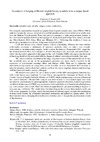Please use this identifier to cite or link to this item:
https://accedacris.ulpgc.es/jspui/handle/10553/69397
| Title: | An analysis of hedging in Modern English history scientific texts: a corpus-based approach | Authors: | Álvarez Gil, Francisco José | UNESCO Clasification: | 5701 Lingüística aplicada | Keywords: | Metadiscourse Adverbs Hedges Stance Evidentiality |
Issue Date: | 2018 | Abstract: | The research conducted has focused on samples from English scientific texts from 1700 to 1900 in order to evaluate the uses and functions of adverbial metadiscourse devices in history scientific texts from the Modern English period. There exist previous attempts to study metadiscourse features in texts from diverse periods of the English language (cf. Moskowich and Crespo 2014; Alonso-Almeida and Mele-Marrero 2014; Gray, Biber and Hiltunen 2011). Following this tradition, I focus on adverbials as metadiscourse devices in the sense in Hyland (2005). I will also discuss some related features, such as evidentiality. Whereas for some scholars evidentiality represents a subdomain of epistemic modality, there are others who consider evidentiality as an independent category. In this context, Dendale and Tasmowski (2001) argue that the relation between these two concepts is divided into disjunction, inclusion, and intersection. I follow the disjunctive approach in this paper in line with Cornillie (2009) who argues that the mode of knowing should not be associated with the degree of authors’ commitment towards their texts. The reason to choose adverbials as the target linguistic devices of this analysis lies on the fact that adverbials stand as one of the grammatical categories that most clearly contribute to the expression of interpersonal meanings (Biber and Finegan 1988). Their use by eighteenth and nineteenth century writers of history texts will be described so as to characterise them in terms of authorial presence, and to check how authors use those devices to negotiate interactional meanings with their potential readers, mostly colleagues. My interest is to explore the use of these adverbs and the different pragmatic functions they fulfil in the history texts analysed. For this, I have interrogated the subcorpus of History of The Coruña Corpus of English Scientific Writing, i.e. CHET, which contains extracts of several historical texts written between 1700 and 1900, using its own retrieval tool, i.e. the Coruña Corpus Tool. Data are retrieved electronically by interrogating this corpus for potential adverbials found in a generated wordlist of all the words in CHET, e.g. presumably, and words likely to be found in adverbial phrases, e.g. with certainty and in truth. These adverbials are quantified and grouped according to degrees of assurance and probability. The results show that depending on the context, these modal adverbs can fulfil several pragmatic functions, such as the indication of different degrees of authorial commitment or detachment towards the information presented, persuasion, and politeness, among others. All of these functions have a hedging effect in the sense that they seek to mitigate the propositional content of the utterance. | URI: | https://accedacris.ulpgc.es/handle/10553/69397 | Source: | XX International Conference on English Historical Linguistics, 27-31 de agosto, Universidad de Edinburgh, p. 31-32 |
| Appears in Collections: | Actas de congresos |
Page view(s)
114
checked on Nov 30, 2024
Download(s)
61
checked on Nov 30, 2024
Google ScholarTM
Check
Share
Export metadata
Items in accedaCRIS are protected by copyright, with all rights reserved, unless otherwise indicated.
